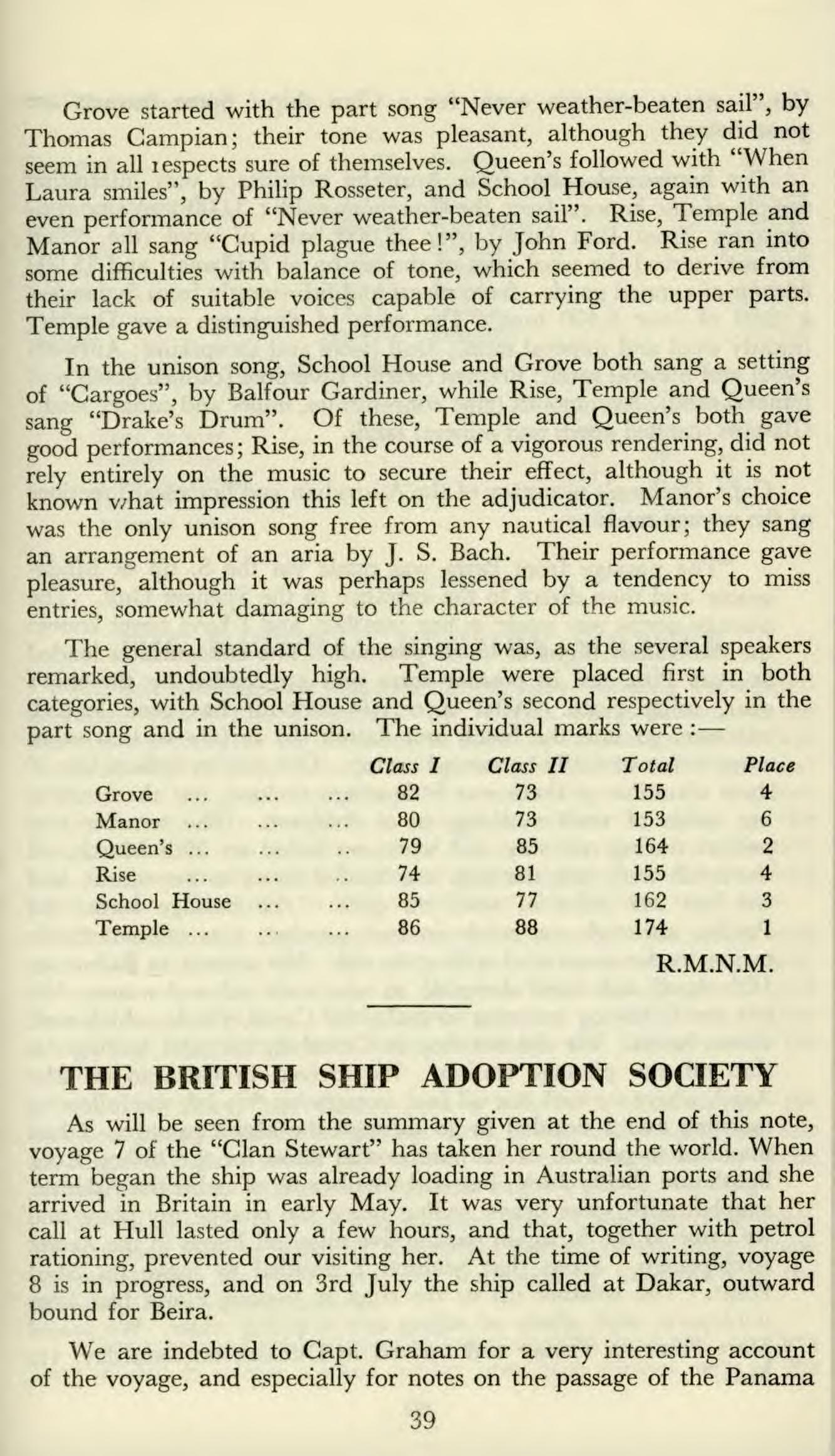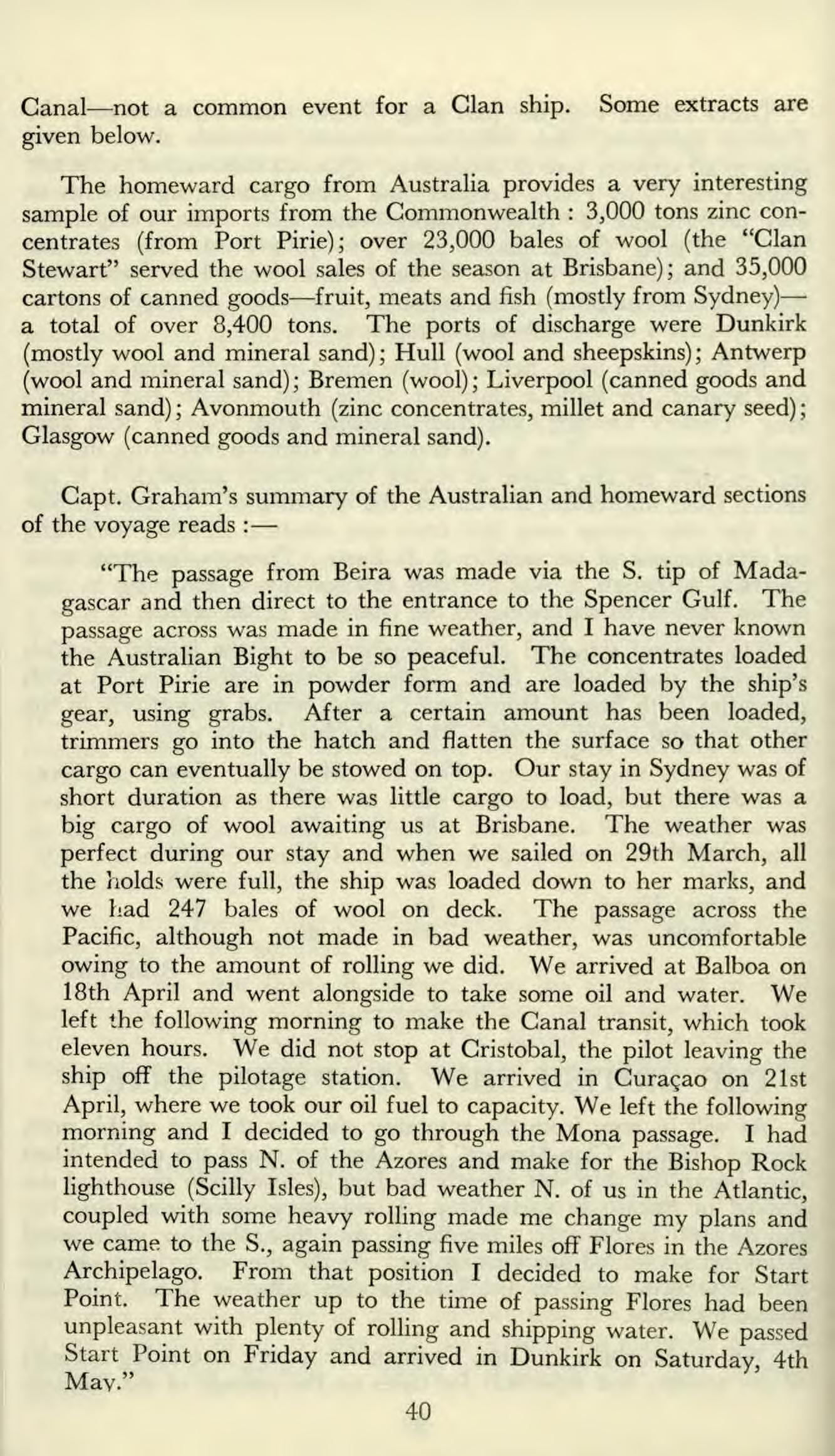
4 minute read
The British Ship Adoption Society
from Oct 1957
by StPetersYork
Grove started with the part song "Never weather-beaten sail", by Thomas Campian; their tone was pleasant, although they did not seem in all respects sure of themselves. Queen's followed with "When Laura smiles", by Philip Rosseter, and School House, again with an even performance of "Never weather-beaten sail". Rise, Temple and Manor all sang "Cupid plague thee !", by John Ford. Rise ran into some difficulties with balance of tone, which seemed to derive from their lack of suitable voices capable of carrying the upper parts. Temple gave a distinguished performance.
In the unison song, School House and Grove both sang a setting of "Cargoes", by Balfour Gardiner, while Rise, Temple and Queen's sang "Drake's Drum". Of these, Temple and Queen's both gave good performances; Rise, in the course of a vigorous rendering, did not rely entirely on the music to secure their effect, although it is not known what impression this left on the adjudicator. Manor's choice was the only unison song free from any nautical flavour; they sang an arrangement of an aria by J. S. Bach. Their performance gave pleasure, although it was perhaps lessened by a tendency to miss entries, somewhat damaging to the character of the music.
The general standard of the singing was, as the several speakers remarked, undoubtedly high. Temple were placed first in both categories, with School House and Queen's second respectively in the part song and in the unison. The individual marks were :-
Grove ... Manor ... Queen's ... Rise ... School House Temple ... Class I Class II Total Place
82 73 155 4 80 73 153 6 79 85 164 2 74 81 155 4 85 77 162 3 86 88 174 1
R.M.N.M.
As will be seen from the summary given at the end of this note, voyage 7 of the "Clan Stewart" has taken her round the world. When term began the ship was already loading in Australian ports and she arrived in Britain in early May. It was very unfortunate that her call at Hull lasted only a few hours, and that, together with petrol rationing, prevented our visiting her. At the time of writing, voyage 8 is in progress, and on 3rd July the ship called at Dakar, outward bound for Beira.
We are indebted to Capt. Graham for a very interesting account of the voyage, and especially for notes on the passage of the Panama 39
Canal—not a common event for a Clan ship. Some extracts are given below.
The homeward cargo from Australia provides a very interesting sample of our imports from the Commonwealth : 3,000 tons zinc concentrates (from Port Pirie); over 23,000 bales of wool (the "Clan Stewart" served the wool sales of the season at Brisbane); and 35,000 cartons of canned goods—fruit, meats and fish (mostly from Sydney)— a total of over 8,400 tons. The ports of discharge were Dunkirk (mostly wool and mineral sand); Hull (wool and sheepskins); Antwerp (wool and mineral sand); Bremen (wool); Liverpool (canned goods and mineral sand); Avonmouth (zinc concentrates, millet and canary seed); Glasgow (canned goods and mineral sand).
Capt. Graham's summary of the Australian and homeward sections of the voyage reads :- "The passage from Beira was made via the S. tip of Madagascar and then direct to the entrance to the Spencer Gulf. The passage across was made in fine weather, and I have never known the Australian Bight to be so peaceful. The concentrates loaded at Port Pirie are in powder form and are loaded by the ship's gear, using grabs. After a certain amount has been loaded, trimmers go into the hatch and flatten the surface so that other cargo can eventually be stowed on top. Our stay in Sydney was of short duration as there was little cargo to load, but there was a big cargo of wool awaiting us at Brisbane. The weather was perfect during our stay and when we sailed on 29th March, all the holds were full, the ship was loaded down to her marks, and we had 247 bales of wool on deck. The passage across the
Pacific, although not made in bad weather, was uncomfortable owing to the amount of rolling we did. We arrived at Balboa on 18th April and went alongside to take some oil and water. We left the following morning to make the Canal transit, which took eleven hours. We did not stop at Cristobal, the pilot leaving the ship off the pilotage station. We arrived in Curacao on 21st
April, where we took our oil fuel to capacity. We left the following morning and I decided to go through the Mona passage. I had intended to pass N. of the Azores and make for the Bishop Rock lighthouse (Scilly Isles), but bad weather N. of us in the Atlantic, coupled with some heavy rolling made me change my plans and we came to the S., again passing five miles off Flores in the Azores
Archipelago. From that position I decided to make for Start
Point. The weather up to the time of passing Flores had been unpleasant with plenty of rolling and shipping water. We passed
Start Point on Friday and arrived in Dunkirk on Saturday, 4th
May."











